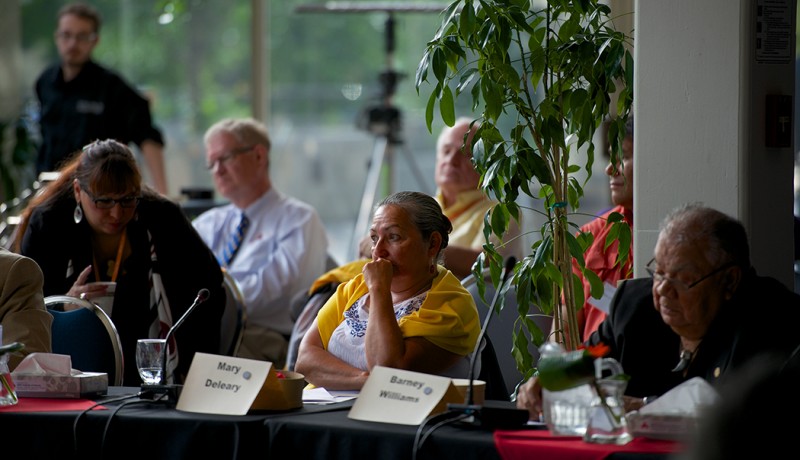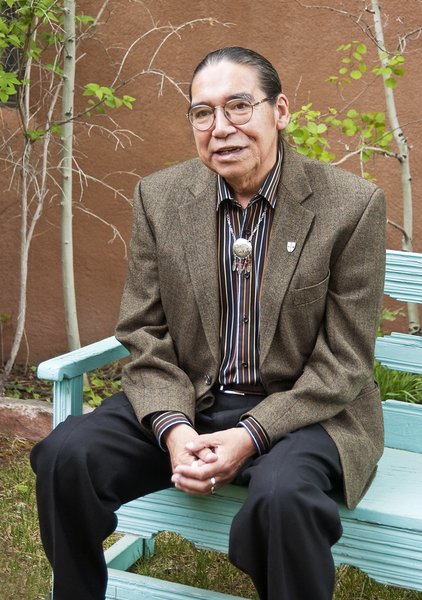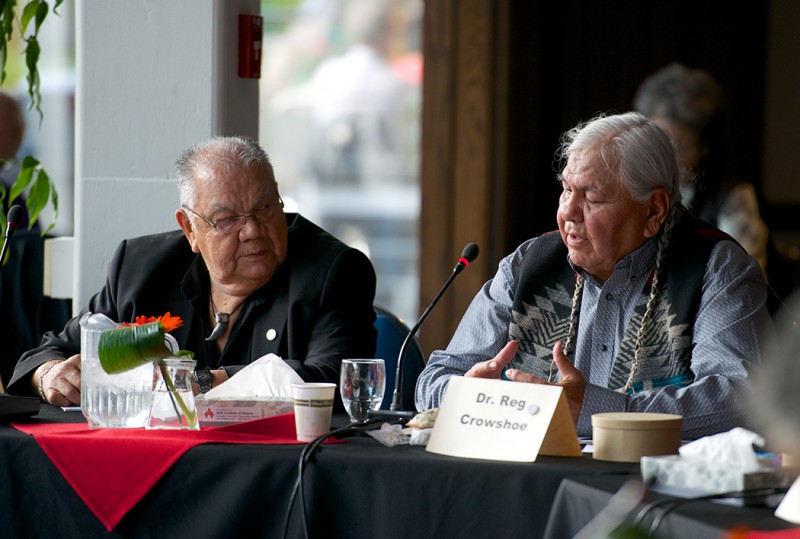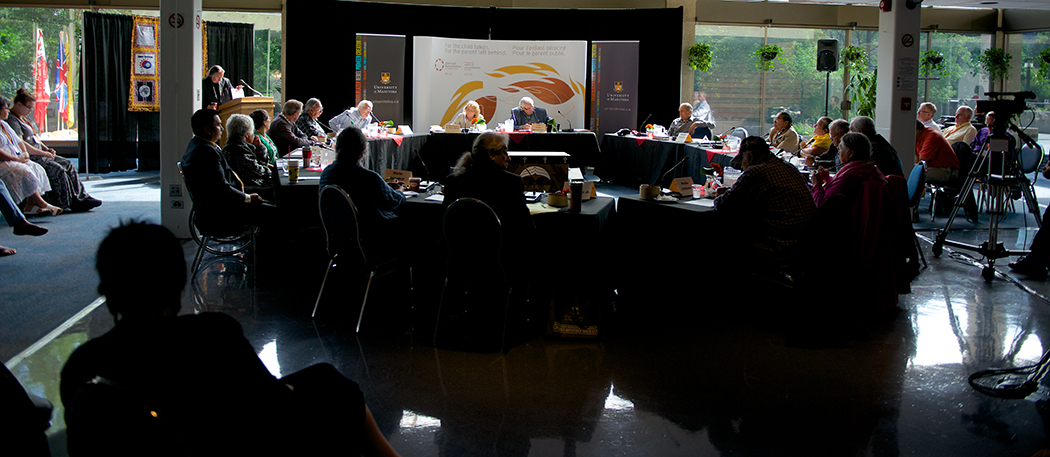
The TRC Traditional Knowledge Keepers Event took place at the U of M on June 25 and 26. // Photo by Adam Dolman
‘The truth of what we need to do has already been spoken here’
Addressing those gathered at the U of M for the Traditional Knowledge Keepers Event Event on its second day, participant Mary Deleary commented on “this hard and beautiful work” of the TRC, work that she called “seeds” that will reach future generations of Aboriginal peoples in Canada.
“The ceremonies, prayers, dances, songs, stories — all of this reconnects us to who we are. It is all part of this time of the 7th Fire,” continued the Algonquian Anishinabe mother and grandmother and Three Fires Midewiwin, who originates from Kitigan Zibi (Garden River), Quebec. Her primary work has been in culturally based education and the acquisition of indigenous knowledge, and who has also worked in the area of culturally based healing practices.
“I know there is still much work to be done, and our youth don’t yet have all they need — but the opportunity is here now,” she said.
Those are seeds we are sending out … and I see the evidence of the work of the 7th Fire; I see all our our ancestors’ work and pain. We have [and are still dealing with] inter-generational trauma … but we are creating something now for our children, through our restringing, our reconnecting….
“We’re a long way from lighting the 8th Fire, from reconciling and creating balance, but the truth of what we need to do has already been spoken here at this table.”
Deleary: “We’re a long way from lighting the 8th Fire, from reconciling and creating balance, but the truth of what we need to do has already been spoken here at this table.”
Anyone who had the opportunity to watch the livestreamed forum that took place on June 25 and 26 knows what a historic and deeply affecting event it was. The participants, Aboriginal elders and spiritual leaders from across the country, told stories and commented on their understanding of forgiveness and reconciliation.
Bringing these traditional knowledge keepers together to wrap up the the work of the Truth and Reconciliation Commission (TRC), established in 2008, the two-day forum continued the TRC’s mandate, which is “to guide and inspire the process of reconciliation in both Aboriginal and non-Aboriginal people.” For the past several years, the TRC has done the work of statement gathering as a way to address the direct effects and ongoing legacy of the 100-year Residential School system.
The traditional knowledge keepers were there to inform the final report of the TRC, and to discuss reconciliation. The commission asked them to provide, on behalf of their own peoples and territories, their understanding of reconciliation and the traditional teachings on reconciliation and forgiveness, and to comment on what they would like the commissioners to say in their final report about reconciliation and healing.
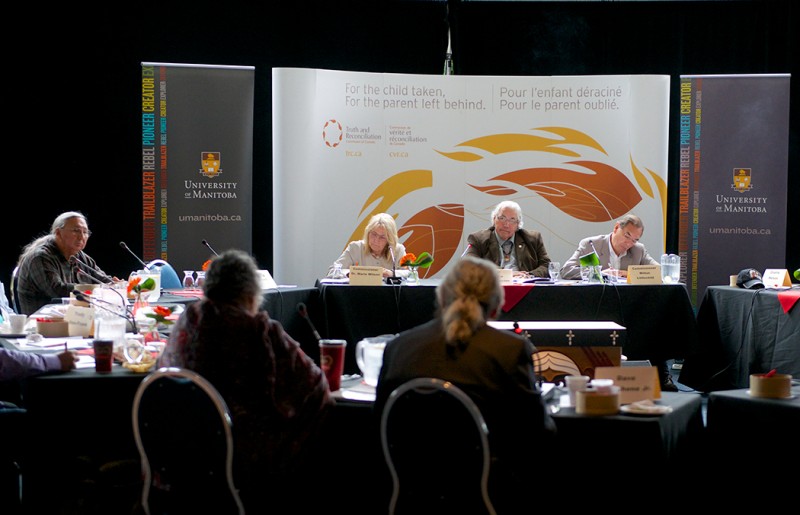
The TRC commissioners at the forum, from left to right, Dr. Marie Wilson, Justice Murray Sinclair and Chief Wilton Littlechild. // Photo by Adam Dolman
Besides commissioners Dr. Marie Wilson, Chief Wilton Littlechild and Justice Murray Sinclair, who chaired the discussion, the forum included 14 or 15 participants from across Canada.
The focus was on three questions:
What is your understanding of reconciliation? — keeping in mind your traditional teachings as you know them, and in practical terms, considering how people might live in a state of reconciliation.
Second, what is needed to achieve reconciliation? — including such considerations as a potential timeline for reconciliation.
And finally, how will we know that reconciliation has been achieved?
Opening the proceedings, Justice Murray also suggested that the speakers consider the following, in the light of the final report to be prepared by the commissioner as a result of the proceedings: What is the nature of forgiveness in the context of reconciliation? Is forgiveness necessary? What messages and recommendations would you like the commissioners to express in their final report?
***
Reconciling? Restoring?
Many told stories and tied the idea of reconciliation to the ongoing effects of what’s been lost and the importance of restoring traditional knowledge and values, such as ceremony.
Stephen Augustine referred to the traditional “sacred balance” resulting from the relationship of Indigenous people to their land. The hereditary chief on the Mi’Kmaq Grand Council from the Signigtog region, Augustine is a member of the Elsipogtog Mi’kmaq First Nations community located outside Rexton, New Brunswick.
That relationship was about survival, he said, and included knowledge about hunting and fishing and gathering for food, medicines and shelter, about clothing and travel and tools of survival.
He addressed the “impact of knowledge loss” due to the Residential Schools period and the “pan-Indianism” in which Indigenous traditions are newly imported into one First Nation from another and shared amongst First Nations.
According to Augustine and others, Indigenous knowledge was traditionally protected and stored by collective sharing through storytelling, songs and spiritual ceremonies. “The teachings are about a way of living, an experience of life that relates to both the seen and unseen,” as he says in the Four Directions Teachings.
Barney Williams also stressed the importance of reviving traditional teachings. “I don’t know [the word] ‘reconciliation’ but I know about ceremony,” he said.
Using the example of preparation one took for events such as hunting, he pointed out that “it doesn’t just happen. It’s a process, one that says ‘Let me make sure I’m going the right way here. Tread softly.'”
The elder and residential school survivor is Nuu-chah-nulth and a member of the Tla-o-qui-aht First Nations in Meares Island, B.C.; he is fluent in the Nuu-chah-nulth language.
“I won’t see reconciliation in my lifetime,” Williams said. “I don’t know what it looks like. All I know is the old people did ceremony — and there were witnesses. We saw what happened ‘if they did this.’
“I don’t have the answer.”
Indigenous peoples “need guidance to have answers,” and for that guidance, he asserted, “we need to go back to ceremonies. Otherwise we’ll keep spinning our wheels, asking ‘what is reconciliation?’ ‘How do we get there?'” he added.
“Our people always seem to come from a place of simplicity … a direct power and connection to Creator, one that comes from here,” he said, pointing to his heart.
“Collectively I believe we can achieve healing for our people. We’re reteaching — not saying ‘you have to reconcile.’ It’s an understanding in the spirit.”
Williams: “Collectively I believe we can achieve healing for our people. We’re reteaching — not saying ‘you have to reconcile.’ It’s an understanding in the spirit.”
For many, he continued, this is so that they (First Nations peoples) can “begin to live a life,” he said.
“Right now they are crying with pain. Reconciliation is the furthest thing from their mind right now.”
Read Part 2 of our special feature on the TRC’s Traditional Knowledge Keepers Forum.
Error thrown
Object of class WP_Error could not be converted to string







